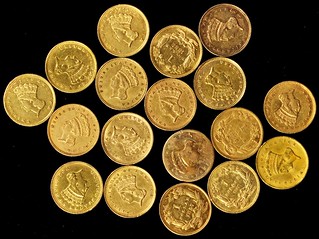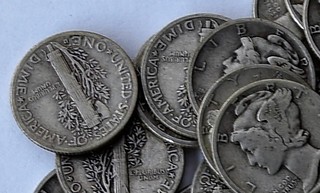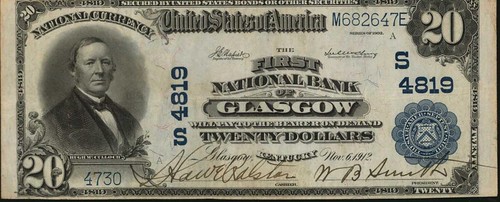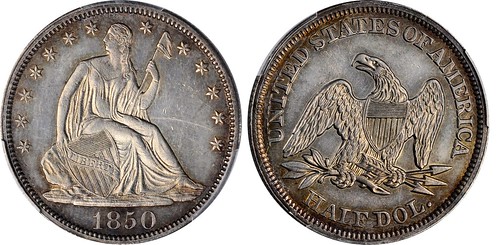
There's a numismatic flair to Dennis Tucker's Coin Update article about Glasgow, Kentucky's "Uncle" Steve Landrum, a thrifty former slave with a head for business and stash of cash. Here's an excerpt - see the complete article online.
-Editor
The details of young Stephen's childhood are lost to history. Enslaved blacks accounted for about 20 percent of Kentucky's population by 1860, many of them in larger cities like Louisville and Lexington, and more on the hemp and tobacco farms of the Bluegrass Region and the Jackson Purchase. We might assume that Stephen's parents were house servants, but such specifics are buried in time.
What we do know about Stephen's life begins mostly in early adulthood. Abraham Lincoln's Emancipation Proclamation didn't extend to slaves in the border states like Kentucky, but the end of the Civil War brought their freedom. Stephen kept his former owners' last name, Landrum, and came to live on Dog Alley in the black section of Glasgow, off what is today James Street.
Stephen Landrum couldn't read or write, but he had a head for math and didn't need paper and a pencil to make calculations. He never had children, instead investing his time and energy into other pursuits—most notably, carefully managed real-estate transactions and rentals. Because he barely trusted banks, he kept his money in cash, and that's how he made his purchases and sales. By the time he died in 1923, he'd amassed a fortune of $100,000 and was one of the wealthiest black men in Glasgow. He was also extremely generous. Uncle Steve is how he was known.
Although Landrum didn't trust banks, he trusted his local attorney of 20 years, the Honorable Mr. E.H. Smith, later editor of the Kentucky State Bar Journal. After Landrum died, Smith recounted some of his eccentricities around money. I have seen ‘Uncle Steve' take money to the bank in a half-gallon tin bucket, and the money would literally be so old, worn, and dirty, that the bank would at once forward it to Washington for redemption.
 In his book Lost and Found Coin Hoards and Treasures, Q. David Bowers shares a 1996 letter from coin collector Bob Ross, who recalled opening a pool room in Glasgow, Kentucky, in 1954.
In his book Lost and Found Coin Hoards and Treasures, Q. David Bowers shares a 1996 letter from coin collector Bob Ross, who recalled opening a pool room in Glasgow, Kentucky, in 1954. A man walked in and wanted to sell some gold and silver coins to me, Ross remembered. They all looked like they were just minted, and some were over a hundred years old. Where had the coins come from? The man I bought these from had been on a construction site when a bulldozer pushed an old shack and the contents into a 20-foot dug water well. He spotted some coins on the path to the well and picked them up. The owner of the property arrived shortly afterward and found enough one-dollar gold coins to make his wife a necklace. He picked up several other gold and silver coins as well. Apparently, the coins were dropping out of an old wood stove that years earlier had been used to heat the now long-abandoned building. It was later learned that any time the old black man, Stephen Landrum (‘Uncle Steve'), who lived there, received money, he would exchange most of the bills for coins. The story was that most of the coins are still down at the bottom of the well. Maybe yes, or maybe no.
 Uncle Steve's preference for keeping gold and silver coins and doing business in cash was confirmed by his attorney, Mr. Smith, writing in the Kentucky State Bar Journal in 1940.
Uncle Steve's preference for keeping gold and silver coins and doing business in cash was confirmed by his attorney, Mr. Smith, writing in the Kentucky State Bar Journal in 1940. One time I helped him in his negotiations to purchase a house in Glasgow for which he was to pay forty-five hundred dollars, Smith reminisced. The deed was drawn and ready for delivery and it was time for ‘Uncle Steve' to pay. ‘Just wait a little while, and I'll be back.' He was gone some fifteen or twenty minutes, and when he returned he had exactly forty-five hundred dollars in a little split-bark basket with a napkin over the money. There was nothing larger than a ten-dollar bill in the basket and there were many ones and several double hands full of silver.
When Smith drew up Uncle Steve's will a few years before his death, he charged him $25 for the service. Uncle Steve paid him with 250 silver dimes.
30 years after Uncle Steve Landrum passed, a Glasgow businessman bought an 1850 half dollar (like the one pictured here) rumored to come from the old man's hidden stash. (Courtesy of Stack's Bowers Galleries.)
Dennis adds:
"I've been fascinated by the life of Uncle Steve Landrum since I first read a brief mention of him in Dave Bowers's book. I love the story of how he paused a real-estate transaction and came back 20 minutes later, paying cash with a basket full of money! And he left part of his estate to help kids learn how to read and write --- things he couldn't do, but still he built a fortune. If you believe the online inflation calculators, his $100,000 in 1923 is equal to about $1.7 million in 2022. The average Americans today has saved just a tiny fraction of that toward retirement—and Stephen Landrum started life as a slave. He was, and is, remarkable."
To read the complete article, see:
From the Colonel's Desk: The marvelous fortune of Glasgow's Uncle Steve Landrum
(https://news.coinupdate.com/from-the-colonels-desk-the-marvelous-fortune-of-glasgows-uncle-steve-landrum/)
Wayne Homren, Editor
The Numismatic Bibliomania Society is a non-profit organization
promoting numismatic literature. See our web site at coinbooks.org.
To submit items for publication in The E-Sylum, write to the Editor
at this address: whomren@gmail.com
To subscribe go to: https://my.binhost.com/lists/listinfo/esylum
Copyright © 1998 - 2024 The Numismatic Bibliomania Society (NBS)
All Rights Reserved.
NBS Home Page
Contact the NBS webmaster
|






